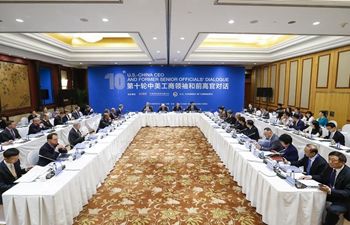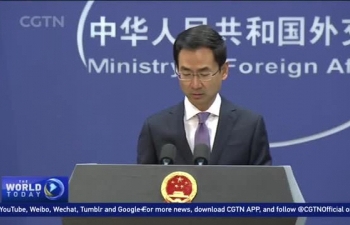MEXICO CITY, May 17 (Xinhua) -- The future of the North American Free Trade Agreement (NAFTA) depends on the ability of the negotiating sides to adopt more flexible positions on the tough issues, Mexico's Economy Minister Ildefonso Guajardo said on Thursday.
"The decisions that are pending are decisions that require, obviously, a political mandate that entails flexibility on each side to be able to reach an agreement," Guajardo told reporters on the sidelines of the 40th National Conference on Regulatory Improvement.
According to the minister, who heads Mexico's negotiating team, since Mexico, Canada and the United States decided to modernize the 1994 trade deal, they have advanced on "a third" of approximately 30 chapters.
"Once there is political agreement on the thornier issues, then progress on the remaining chapters should be very quick," said Guajardo.
Among the issues that still require political will to resolve, the main ones are automotive rules of origin that lower the amount of foreign-made parts allowed in vehicles manufactured in North America; the inclusion of a so-called sunset clause that would allow the deal to automatically terminate every five years, unless the parties agree to keep it going; and agricultural seasonality clauses that would effectively cap fruit and vegetable exports, all proposed by Washington.
NAFTA is being renegotiated on the insistence of U.S. President Donald Trump, who took office on a campaign pledge to secure a trade deal that was more favorable to U.S. side.
While the negotiations, which began in August, continued throughout April and part of May, a lack of flexibility prevented any breakthroughs, said Guajardo.
"It's not a technical challenge, it is a challenge of will to reach an agreement that can work for everyone," he said.
"If the conditions are outlined next week, there's nothing to stop us from closing this deal before the end of May," he added.
May 17 loomed as a deadline for a preliminary agreement after Paul Ryan, the speaker of the U.S. House of Representatives, last week said that for congress to approve a revamped NAFTA, an agreement in principle had to be submitted by that date, or congress would not have enough time to debate and approve it before legislative elections in November.
That is unlikely to happen, Guajardo indicated, saying there was no date set for the next meeting with his Canadian and U.S. counterparts, Canadian Foreign Affairs Minister Chrystia Freeland, and U.S. Trade Representative Robert Lighthizer.













